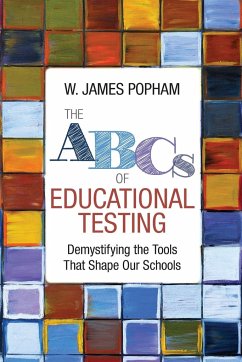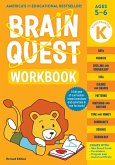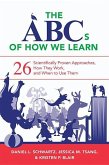- Broschiertes Buch
- Merkliste
- Auf die Merkliste
- Bewerten Bewerten
- Teilen
- Produkt teilen
- Produkterinnerung
- Produkterinnerung
This text builds fundamental knowledge and helps to clarify a lot of the misunderstanding around testing in a conversational tone. It is framed around practical actions that can be taken to strengthen assessment literacy.
Andere Kunden interessierten sich auch für
![Brain Quest Workbook: Kindergarten Brain Quest Workbook: Kindergarten]() Lisa TrumbauerBrain Quest Workbook: Kindergarten10,99 €
Lisa TrumbauerBrain Quest Workbook: Kindergarten10,99 €![The ABCs of Metallica The ABCs of Metallica]() MetallicaThe ABCs of Metallica16,99 €
MetallicaThe ABCs of Metallica16,99 €![The ABCs of Socialism The ABCs of Socialism]() The ABCs of Socialism13,99 €
The ABCs of Socialism13,99 €![The ABCs of How We Learn The ABCs of How We Learn]() Daniel L. Schwartz (Stanford University Graduate School of EducatioThe ABCs of How We Learn32,99 €
Daniel L. Schwartz (Stanford University Graduate School of EducatioThe ABCs of How We Learn32,99 €![V Is for Vegan: The ABCs of Being Kind V Is for Vegan: The ABCs of Being Kind]() Ruby RothV Is for Vegan: The ABCs of Being Kind15,99 €
Ruby RothV Is for Vegan: The ABCs of Being Kind15,99 €![The ABCs of the Environment The ABCs of the Environment]() Kalman BobbieThe ABCs of the Environment12,99 €
Kalman BobbieThe ABCs of the Environment12,99 €![The Little Sailor's ABCs The Little Sailor's ABCs]() Elayna CarausuThe Little Sailor's ABCs23,99 €
Elayna CarausuThe Little Sailor's ABCs23,99 €-
-
-
This text builds fundamental knowledge and helps to clarify a lot of the misunderstanding around testing in a conversational tone. It is framed around practical actions that can be taken to strengthen assessment literacy.
Hinweis: Dieser Artikel kann nur an eine deutsche Lieferadresse ausgeliefert werden.
Hinweis: Dieser Artikel kann nur an eine deutsche Lieferadresse ausgeliefert werden.
Produktdetails
- Produktdetails
- Verlag: SAGE Publications Inc
- Seitenzahl: 178
- Erscheinungstermin: 23. November 2016
- Englisch
- Abmessung: 229mm x 152mm x 10mm
- Gewicht: 282g
- ISBN-13: 9781506351513
- ISBN-10: 1506351514
- Artikelnr.: 45345132
- Herstellerkennzeichnung
- Libri GmbH
- Europaallee 1
- 36244 Bad Hersfeld
- gpsr@libri.de
- Verlag: SAGE Publications Inc
- Seitenzahl: 178
- Erscheinungstermin: 23. November 2016
- Englisch
- Abmessung: 229mm x 152mm x 10mm
- Gewicht: 282g
- ISBN-13: 9781506351513
- ISBN-10: 1506351514
- Artikelnr.: 45345132
- Herstellerkennzeichnung
- Libri GmbH
- Europaallee 1
- 36244 Bad Hersfeld
- gpsr@libri.de
W. James Popham, professor emeritus at University of California Graduate School of Education and Information Studies, has spent the bulk of his educational career as a teacher. His first teaching assignment, for example, was in a small eastern Oregon high school where he taught English and social studies while serving as yearbook advisor, class sponsor, and unpaid tennis coach. That recompense meshed ideally with the quality of his coaching. Most of Dr. Popham¿s teaching career took place at UCLA where, for nearly 30 years, he taught courses in instructional methods for prospective teachers as well as courses in evaluation and measurement for graduate students. At UCLA he won several distinguished teaching awards. In January 2000, he was recognized by UCLA Today as one of UCLA's top 20 professors of the 20th century. (He notes that the 20th century was a full-length century, unlike the current abbreviated one.) In 1992, he took early retirement from UCLA upon learning that emeritus professors received free parking. Because at UCLA he was acutely aware of the perishability of professors who failed to publish, he spent his non-teaching hours affixing words to paper. The result: 30 books, 200 journal articles, 50 research reports, and 175 papers presented before research societies. Although not noted in his official vita, while at UCLA he also authored 1,426 grocery lists. His most recent books are Classroom Assessment: What Teachers Need to Know, 6th Ed. (2010) and Assessment for Educational Leaders (2006), Allyn & Bacon; The Truth About Testing (2001), Test Better, Teach Better (2003), Transformative Assessment (2008) and Instruction that Measures Up (2009) ASCD; America's "Failing" Schools (2005) and Mastering Assessment (2006), Routledge; and Unlearned Lessons (2009) Harvard Education Press. He encourages purchase of these books because he regards their semi-annual royalties as psychologically reassuring. In 1978, Dr. Popham was elected to the presidency of the American Educational Research Association (AERA). He was also the founding editor of Educational Evaluation and Policy Analysis, a quarterly journal published by AERA. A Fellow of the Association, he has attended each year¿s AERA meeting since his first in 1958. He is inordinately compulsive. In 1968, Dr. Popham established IOX Assessment Associates, an R&D group that formerly created statewide student achievement tests for a dozen states. He has personally passed all of those tests, largely because of his unlimited access to the tests' answer keys. In 2002 the National Council on Measurement in Education presented him with its Award for Career Contributions to Educational Measurement. In 2006 he was awarded a Certificate of Recognition by the National Association of Test Directors. In 2009, he was appointed to be a board member of the National Assessment Governing Board. Dr. Popham's complete 44-page, single-spaced vita can be requested. It is really dull reading. School Leadership Briefing Interview
Preface
About the Author
1. Why Fuss With Educational Testing?
2. Three Primary Purposes of Educational Testing
3. Behind Standardized Testing's Cloudy Curtain
4. Validity: The Crux of the Caper
5. Reliability: Considering Consistency in Inconsistent Containers
6. Fairness in Testing: A Long Time Coming
7. Reporting Results: Where Rubber and Road Meet
8. Formative Assessment: Instructional Magic?
9. Students' Affect: Underappreciated, Undermeasured
10. What Next?
Glossary
References
Index
About the Author
1. Why Fuss With Educational Testing?
2. Three Primary Purposes of Educational Testing
3. Behind Standardized Testing's Cloudy Curtain
4. Validity: The Crux of the Caper
5. Reliability: Considering Consistency in Inconsistent Containers
6. Fairness in Testing: A Long Time Coming
7. Reporting Results: Where Rubber and Road Meet
8. Formative Assessment: Instructional Magic?
9. Students' Affect: Underappreciated, Undermeasured
10. What Next?
Glossary
References
Index
Preface
About the Author
1. Why Fuss With Educational Testing?
2. Three Primary Purposes of Educational Testing
3. Behind Standardized Testing's Cloudy Curtain
4. Validity: The Crux of the Caper
5. Reliability: Considering Consistency in Inconsistent Containers
6. Fairness in Testing: A Long Time Coming
7. Reporting Results: Where Rubber and Road Meet
8. Formative Assessment: Instructional Magic?
9. Students' Affect: Underappreciated, Undermeasured
10. What Next?
Glossary
References
Index
About the Author
1. Why Fuss With Educational Testing?
2. Three Primary Purposes of Educational Testing
3. Behind Standardized Testing's Cloudy Curtain
4. Validity: The Crux of the Caper
5. Reliability: Considering Consistency in Inconsistent Containers
6. Fairness in Testing: A Long Time Coming
7. Reporting Results: Where Rubber and Road Meet
8. Formative Assessment: Instructional Magic?
9. Students' Affect: Underappreciated, Undermeasured
10. What Next?
Glossary
References
Index








